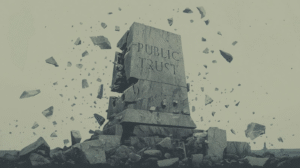Okay, let’s be real for a second. Remember that feeling—that sense of public trust? That faith in the institutions shaping our lives—the government, the media, even the local PTA—acting in good faith with our best interests at heart? Yeah, me neither, not lately anyway.
It feels like public trust in pretty much everything has nosedived, a swan dive into cynicism and doubt. And I’m not just talking about grumpiness on Twitter after the latest headline. This erosion of public trust has serious consequences, affecting everything from voter turnout to public health responses to, frankly, our general ability to agree on… well, anything.
So, what’s going on? Why are we all so skeptical all of a sudden? Let’s unpack this, because understanding the problem is the first step toward, hopefully, fixing it.
The Blame Game: A Multifaceted Malaise
Overview
There isn’t a single villain here. A cast of problematic forces contributes to the widespread unease. Below are the major players in the drama of diminishing trust.
The Rise of Partisanship (and the Death of Nuance)
Politics feels louder and less nuanced. People question motives, intelligence, and basic humanity. Echo-chamber media feed biases and demonize the “other side,” fueling a us-vs-them mentality that erodes trust.
The Media Landscape is a… Landscape
News came from a few trusted sources, then from many. Algorithms prioritize engagement over accuracy, spreading misinformation. Fake news exists alongside strained credibility, making it exhausting to separate fact from fiction and often leading to distrust.
Tech and the Echo Chamber Effect
Social media connects us, but it also creates echo chambers. Algorithms promote confirmation, hardening beliefs and limiting exposure to dissent. This fosters polarization and erodes empathy across viewpoints.
Economic Inequality and Being Left Behind
The American Dream feels distant as wages stagnate and living costs rise. Perceived systemic rigging lowers trust in institutions perceived as serving the wealthy, fueling resentment.
Broken Promises and Accountability Gaps
Promises to reform or fight for the working class often go unfulfilled. When failures occur, accountability is scarce, reinforcing a sense that the system is rigged.
Perception of Corruption (Real or Imagined)
Whether real or believed, corruption stories damage public trust. High-profile abuses or lobbying feed a narrative of systemic rot, shaping opinion even from isolated incidents.
The “Everything’s a Conspiracy” Mindset
Easy access to information also means easy manipulation. Conspiracy theories provide simple explanations for complex problems, appealing to those feeling betrayed by institutions.
Okay, We’re Doomed. Right? (Hopefully Not)
The Mood: Bleak But Not Hopeless
The picture looks bleak, but rebuilding public trust is possible. It’s a long, multi-pronged effort requiring institutions, individuals, and everything in between. So, where to start?
A Patchwork of Ideas (Brainstorming Style)
Here are several ideas that might help patch up the trust deficit.
Transparency, Transparency, Transparency
- Key principle: Open up information and decision-making.
- Actions: live-stream committees, publish data sets, explain policy choices clearly.
- Sunlight is the best disinfectant.
Accountability, Accountability, Accountability
- When mistakes happen, take responsibility.
- Acknowledge errors, apologize, and implement fixes.
- Hold everyone to account: politicians, executives, and officials alike.
Media Literacy Is Essential
- Equip people to evaluate information and spot misinformation.
- Teach media literacy in schools; promote fact-checking.
- Learn to identify bias and assess credibility.
Promote Civil Discourse (Even When It’s Hard)
- Bridge divides through respectful dialogue.
- Create spaces for constructive debate and listening to understand.
- Seek common ground and be willing to compromise.
Reform Campaign Finance (Money Talks Too Loudly)
- Reduce the influence of wealthy donors and corporations.
- Consider limits on contributions, ban certain lobbying, and increase transparency.
- Aim for a level playing field where all voices count.
Invest in Education and Opportunity
- Address economic inequality with access to affordable education and training.
- Provide resources to help people rise economically.
- Tackle systemic inequalities affecting marginalized communities.
Community Engagement Is Key
- Institutions should actively engage with the communities they serve.
- Listen to concerns, seek input, and respond to needs.
- Build relationships with community groups and leaders.
Embrace Humility
- Ditch arrogance; acknowledge limits and learn from feedback.
- Humility fosters connection; arrogance breeds distrust.
It’s a Long Road, But We Gotta Start Somewhere
Rebuilding public trust is not going to be easy. It’s a long and complex process that will require sustained effort from everyone. But it’s essential for the health and well-being of our society. We can’t function as a democracy if we don’t trust our institutions.
So, let’s start small. Let’s start by engaging in respectful dialogue with people who disagree with us. Begin to evaluate the information we consume critically. Let’s start by holding our institutions accountable. And let’s start by believing that we can build a better future, one built on trust, transparency, and a shared commitment to the common good.
What do you think? What are some other ways we can rebuild public trust in institutions? Let’s discuss in the comments! Maybe, just maybe, we can start to turn this ship around, one conversation at a time.

